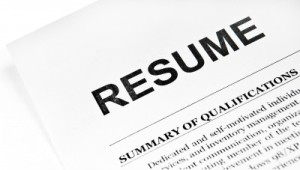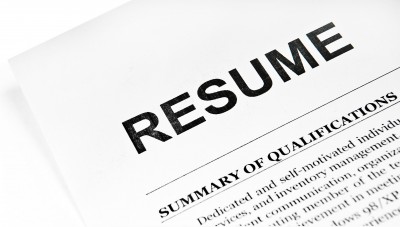 Writing a good resume takes preparation and practice. Employers receive hundreds of resumes per job posting; therefore, it’s important to make your resume set you apart and provide a good first impression. The increased use of social media causes some people to question if resumes are still relevant. Despite changing times and generations, the answer remains: YES. Resumes are the core of most job applications and therefore should be used, along with a cover letter, to demonstrate why you are the best candidate for the position.
Writing a good resume takes preparation and practice. Employers receive hundreds of resumes per job posting; therefore, it’s important to make your resume set you apart and provide a good first impression. The increased use of social media causes some people to question if resumes are still relevant. Despite changing times and generations, the answer remains: YES. Resumes are the core of most job applications and therefore should be used, along with a cover letter, to demonstrate why you are the best candidate for the position.
1. Allow Yourself to be Contacted
This may seem obvious at first, but it’s imperative to include all of the appropriate contact information on your resume, so employers can easily get in touch with you. Street addresses are viewed as irrelevant and technology can kick out your resume because of your zip code. Instead use your professional LinkedIn URL and include a professional email address. Use something as basic as (yourname)@gmail.com. Place your contact information on top. Bold your name. Finally, name your resume document using your first and last name (example “Clark.Jenkins resume.doc”) so it is easy for the hiring manager to find.
2. Quality, not Quantity
Only include experiences you think are relevant to the job. Focus on previous employment that can demonstrate experience that is significant to the posting. Keep your resume length at one to two pages. The descriptions of your most recent and most relevant positions should be the longest. Someone a few years out of college would likely have a one-page resume where a senior level position may call for two to three pages.
3. Adapting Your Resume to Your Target Audience
Always make sure to tailor your resume, including job titles and descriptions, to the job for which you are applying. Each time, before you send your resume for a specific position, research the position and company. Create a master resume, which will list your job experience, education and skills. As you prepare to apply for a specific job, customize your resume to reflect the priorities emphasized by the company for this position, using language similar to theirs.
4. Uniformity with Format
Make sure that the formatting is consistent throughout. Use clear titles or headings; make it easy for an employer to navigate the page. Use oversized titles and subtitles to highlight information that you want the recruiter to immediately see when they begin reviewing your resume. Use bullet points instead of paragraphs for your descriptions. This makes it much easier to read when someone has only a few seconds to glance over your resume.
5. Forget Objectives and Summarize your Skills
Years ago, the traditional “Career Objective” statement was used. Instead of a “Career Objective,” follow your target job title with a “Performance Summary” or a “Unique Value Proposition” that addresses the skills you have to offer as they relate to the employer’s needs. You want to be accurate, but also creative in selling your experience, skills and knowledge. Write three to six lines that showcase your ability to execute the requirements cited in the posting. By addressing an employer’s needs right up front and using the key phrases they use, you demonstrate that you understand the job, and you are using the keywords most likely to give your resume greater visibility.
6. Use Action Verbs to Cause Action
When describing your work experience, begin with strong action verbs that best describe your accomplishments, achievements and responsibilities. List the most impressive and important descriptions first. Some action examples include:
“Exceeded annual sales plan by 10%”
“Secured $8M during funding freeze to save critical programs
Make sure to avoid passive phrases such as:
“Was responsible for driving sales within my department
“Was on a team that developed new time-saving initiatives”
7. Proofread, Proofread, Proofread
Before hitting the send or print button, ask a trusted family member, friend or colleague to proofread your material. Many hiring managers will immediately toss a resume upon catching even the slightest blunder or mistake. Be sure to read your resume from the employer’s perspective. What do they need to know to be motivated to contact you for an interview?
A flawless resume remains one of the best ways for job candidates to catch the eye of a hiring manager and make a great first impression. What resume tips have you learned over the years?
Clark Jenkins is Vice President for ICC, an OI Global Partner, and is passionate about creating brand awareness and building lasting relationships within the Cincinnati business community. To connect with Clark follow him on Twitter at @clarkajenkins, or on LinkedIn, click here.
Share this post:


No responses yet